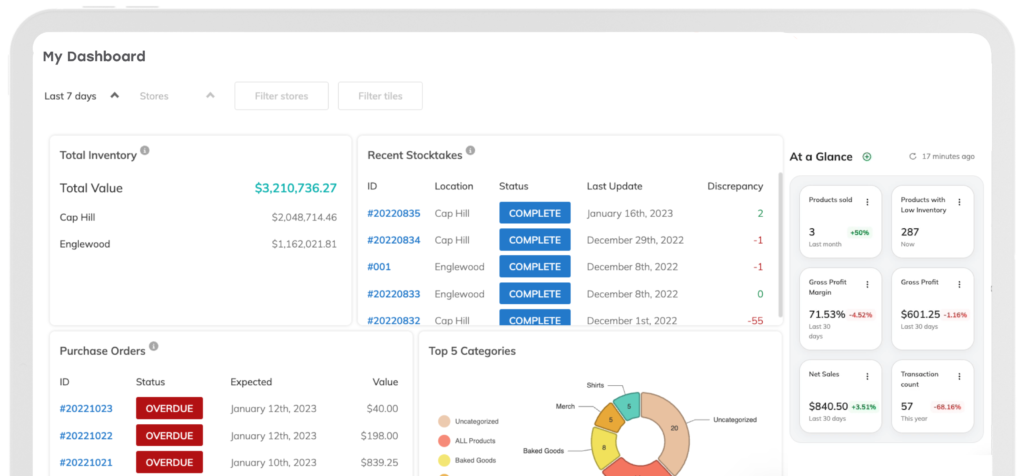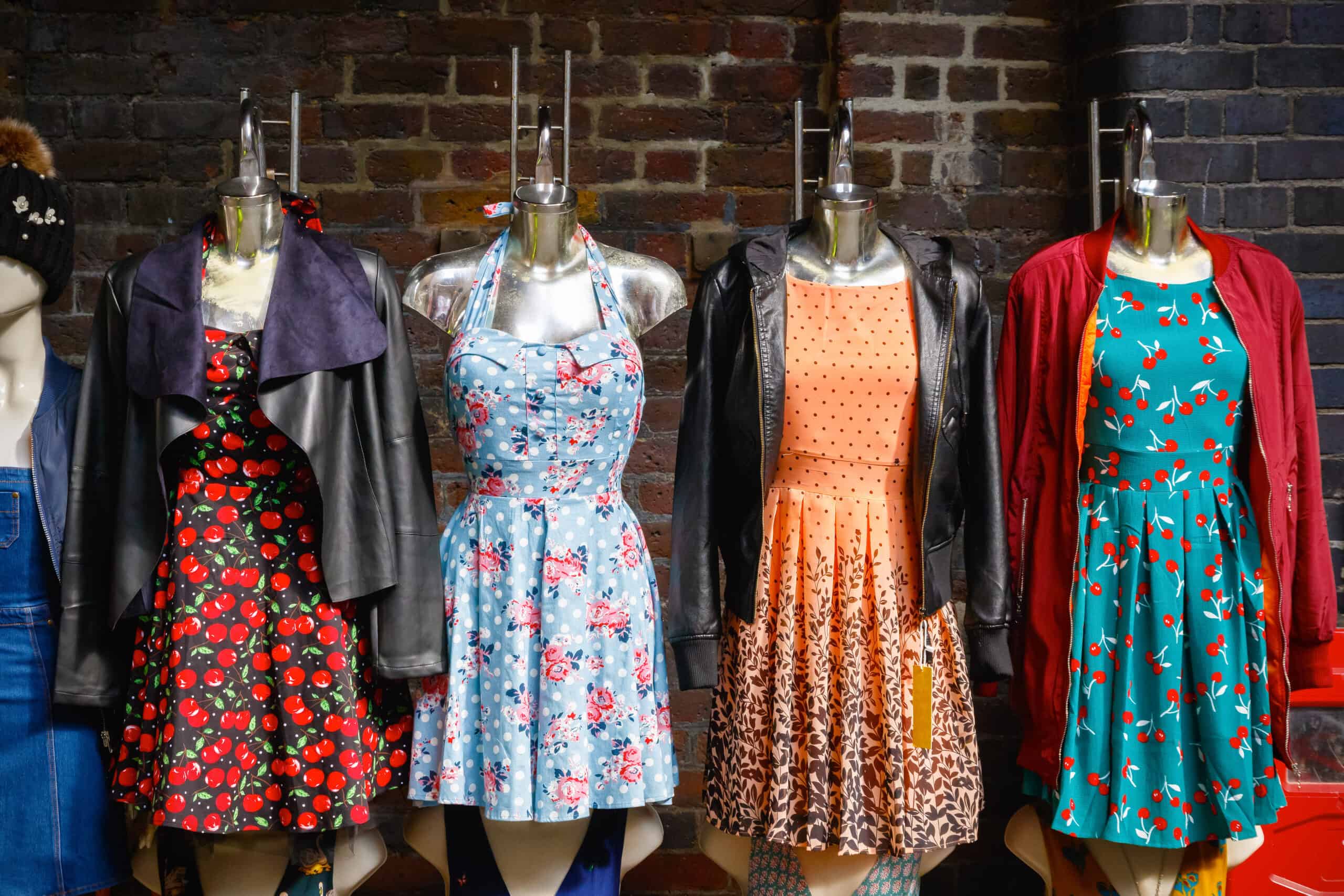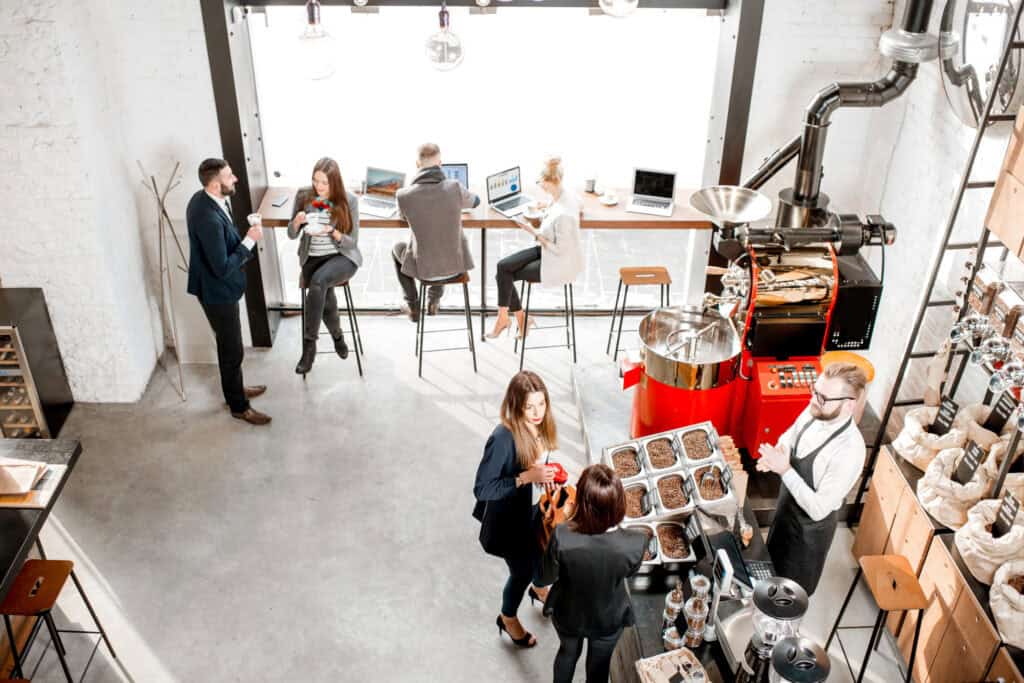
Reasons Why The Most Successful Coffee Shops Roast In-House
Gone are the days of needing to outsource coffee roasting to a third party. New technologies make in-house roasting so easy that every coffee business should do it. Read on for all the reasons why coffee shops should roast their own beans.
What You'll Learn In This Blog
What Is An In-House Coffee Roasting Program?
An in-house roasting program is a system in which you take full control of your coffee beans’ production process from start to finish.
First, you’ll need to acquire unroasted green coffee beans — or the raw unroasted seeds that every cup of Joe starts as — and coffee roasting equipment. The good news is all of this will be stored either on-site at your coffee shop or at an off-site location you own that’s dedicated to roasting. That said, your in-house roasting setup may require just green beans if you have an electric coffee roaster machine that fits right where your baristas do their work.
8 Reasons To Start Roasting Your Own Coffee
1. You’ll increase your profit margins
Increased profit margins are one of the most obvious benefits of roasting in-house. The Specialty Coffee Association (SCA) found that, while the average profit margin for coffee shops that year was 6.86%, that number jumped to 8.79% for roasting retailers.
Today, profit margins for java-based businesses have reached 15%, according to an analysis from Sharpsheets of financial data from more than 2,100 U.S. coffee shops. While recent data hasn’t yet identified how high that number climbs if you’re roasting in-house, it’s safe to say those with roasting programs are likely to see a higher overall profit margin. After all, developing your own brand rather than leaning on a supplier for your beans does wonders for making your business more profitable.
2. You’ll save money in the long run
As you look into how to start a roasting program in your shop, you’ll likely encounter high startup costs. You will, after all, need to acquire permits, buy an electric roaster, and potentially renovate your space to accommodate your in-house coffee roasting setup. In fact, according to Sharpsheets’ analysis, coffee shop startup costs typically span $330,000 to $1 million for a retail space of 1,500 to 2,000 square feet.
However, almost all businesses, especially retail locations, entail high upfront costs — and this initial spending often leads to long-term savings. Bringing processes in-house that you might outsource is almost always less expensive, and less of the markup on all the cups of joe you sell will go to a third party. These cost savings in roasting lead to profitability sooner than later, giving you peace of mind about repaying your startup loans.
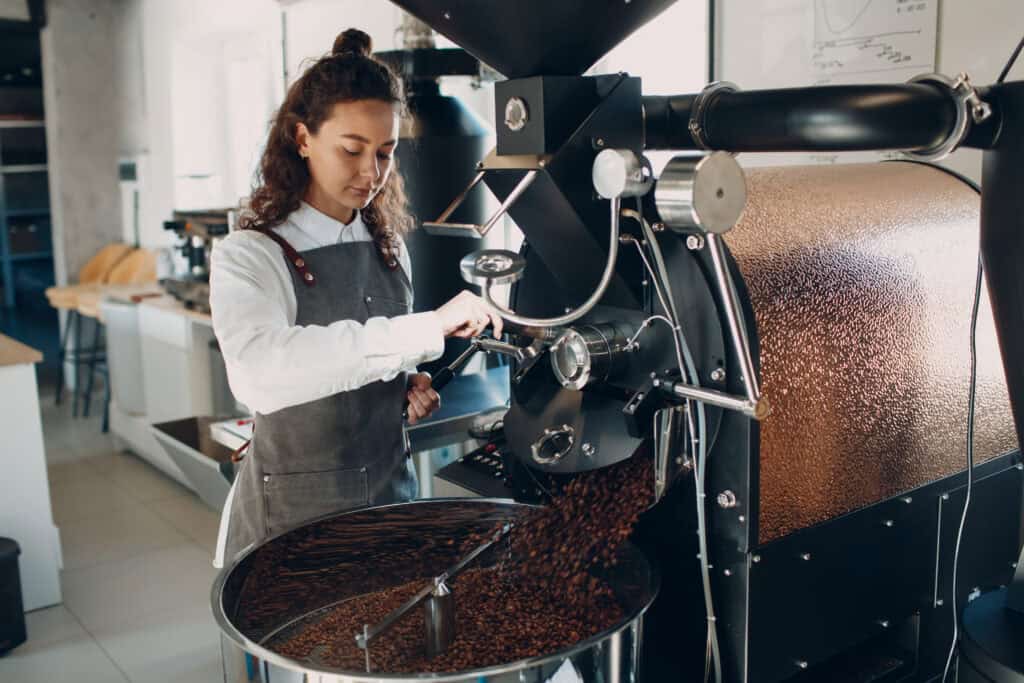
3. Your beans will be as fresh as it gets
When you source your beans from a wholesale roaster, your beans will always be less fresh. When you buy your own green beans and roast them in-house, your customers always get freshly roasted beans. If they’re buying your beans whole, they’ll taste the difference with every homebrew. And if they’re buying your drinks in-store, they’ll taste the high quality while still in your shop. They might even buy another drink while they’re at it, and tell their friends about your coffee to boot.
As an example, suppose you’ve been getting your roasted coffee from a third-party retailer. You might be happy with your relationship with this supplier, but the beans take two weeks to arrive — and freshness declines during those two weeks. For a true bean-to-cup experience, roasting your own may be the way to go.
4. You’ll have ultimate control over flavor
Coffee consumers come in all shades and stripes, and some want more than a caffeine boost — they seek out the very best quality. If you’re roasting coffee in-house, you’re more likely to deliver on that promise. You’ll have all the equipment you need to experiment with roasting methods and see how they affect your drinks’ flavor. Whether your customers prefer a bright-tasting light roast or a sharp and robust dark roast, there are numerous possibilities to get creative.
One potential challenge to keep an eye out for is achieving consistency with each roast. This is sometimes difficult when roasting in-house, as different batches of the same coffee beans may react differently to the same settings on your roasting machine. Carefully monitor how you create your flavor profiles, commit to regular cuppings, and adjust continuously for stronger quality control.
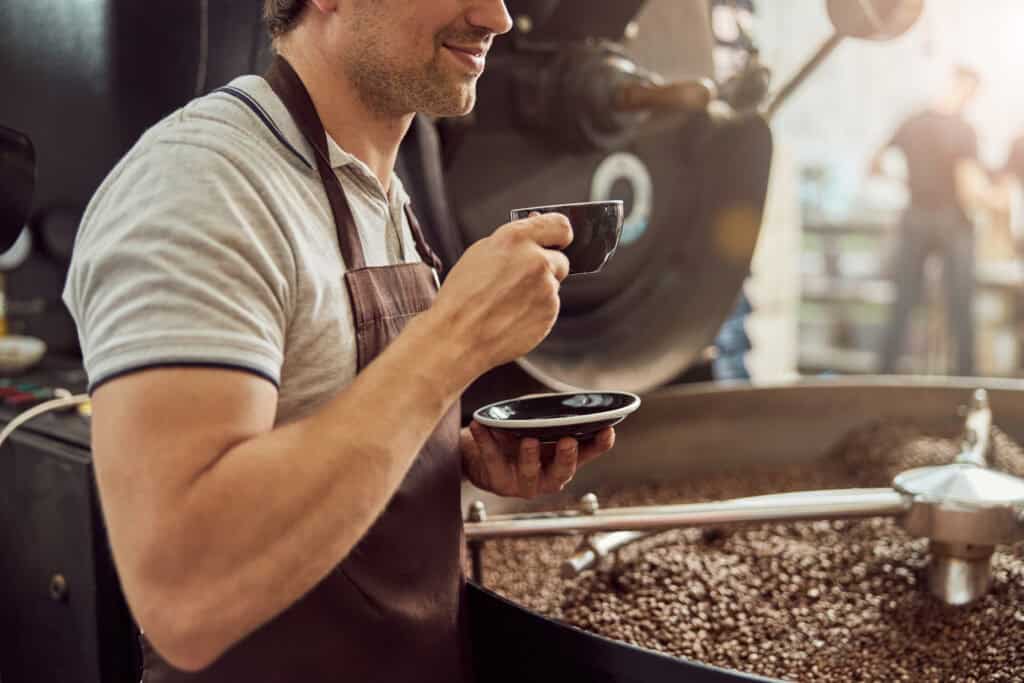
Each flavor is another way to achieve meaningful coffee shop differentiation in an ever-crowded, eternally competitive market. All of your flavors come from your arsenal of roast profiles, which are only possible to develop in the first place when you start roasting your own beans.
For example, suppose you’ve been getting one type of coffee beans in bulk from another coffee business — and only that bean. This arrangement limits you to serving one type of coffee, and without an exclusivity agreement, your supplier is surely providing this same bean to other coffee shops too. If you buy green coffee beans and roast your own, you’ll be able to come up with any flavor profile you’d like.
This is a great way to engage your customers. Send a survey to your email list or put out surveys in-store to get a sense of what they’d like to try. Consider a roast profile nobody else is offering — sure, French vanilla coffees abound, but maple vanilla pecan is way more likely to get the community buzzing.
5. You’ll have an easier time with market differentiation
Getting ambitious flavor profiles off the ground is a key step in elevating your coffee brand. Take your efforts a step further and give your unique flavor profiles original names. Brands such as Chicago-based company Dark Matter offer freshly roasted coffee bean flavors such as “Unicorn Blood” and “A Love Supreme.” It’s a great way to add a personal touch and catch customer’s attention.

When there are so many coffee enthusiasts and so many other coffee shop owners out there, market differentiation is key to standing out. In addition to unique branding, focus on omnichannel marketing to expand your reach to potential new customers.
Consider how your brand extends beyond simply being a coffee shop. Are there opportunities to share your unique expertise in the field through social channels or blogging? These platforms are a great way to showcase what makes your business special, whether it’s offering an inside look into your roasting process or highlighting your shop’s commitment to sustainability. The sky’s the limit when you think about the vast knowledge only your team can offer a broad audience of coffee lovers.
6. You’re more likely to source your beans ethically and sustainably
One of the biggest advantages of in-house coffee roasting for cafes is that it gives you more control and awareness of your supply chain. There’s much less chance you could accidentally be acquiring your raw materials from an unethical or unsustainable partner when you’re roasting your own coffee. Instead, you’ll be working directly with coffee farmers to obtain green beans.
Liaising directly with farmers gives you the power to choose suppliers whose labor conditions and environmental impact meet key standards. Fairtrade America, Rainforest Alliance, and World Coffee Research all operate programs designed to make sustainable and ethical farming the standard.
Additionally, SCS Global Services and Starbucks maintain a list of verified organizations that audit suppliers’ adherence to Coffee and Farmer Equity (C.A.F.E.) practices. Contacting these auditors and asking for supplier recommendations may help you identify the right farming partner for your ethics and sustainability goals.
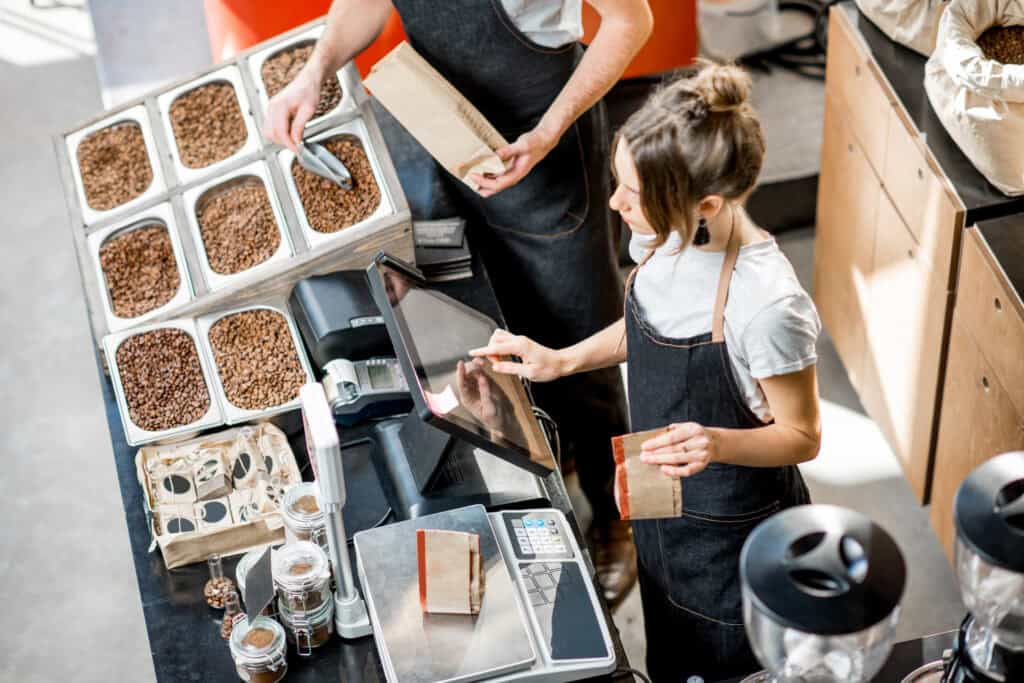
7. You’ll open up new revenue streams for your coffee business
Once you’ve expanded your shop into a full-on coffee roasting business, you broaden your potential reach well beyond your cafe. Yes, you’ll be able to sell bags right at the counter, but there’s so much more possibility than that.
For starters, consider selling wholesale coffee beans, meaning you’ll include other retailers among your individual customers. This arrangement is how small coffee shops land their beans in supermarkets, gift shops, and gourmet grocers. Another option is to sell your roasted coffee beans to local hotels to fuel their kitchens, as well as to other coffee shops. After all, you were probably buying your beans from another roaster at one point — why not pay it forward to another early-stage coffee shop?
Roasting in-house also makes it possible to expand to e-commerce and offer online coffee subscriptions. For example, in-store visitors who love your dark roasts may want to automatically have a bag delivered every couple of weeks. Converting these passionate customers to online subscribers guarantees regular sales and gives them newfound convenience for enjoying your best roast profiles. It’s one of the best strategies to grow your business and make your customers extra happy.
Easily Expand Your Coffee Roasting Business With Thrive Inventory
Roasting your own coffee beans not only sets your cafe apart, it requires running a whole other side to your business. Thrive Inventory has a suite of features for roasting that connects inventory of all of your locations and sales channels, along with automating complicated fulfillment processes.
8. You’ll transform your coffee shop into a full-on experience
Once you’ve started roasting your own beans, you put your business in a position to be so much more than a cafe. You broaden its potential horizons into the territory of an immersive coffee experience.
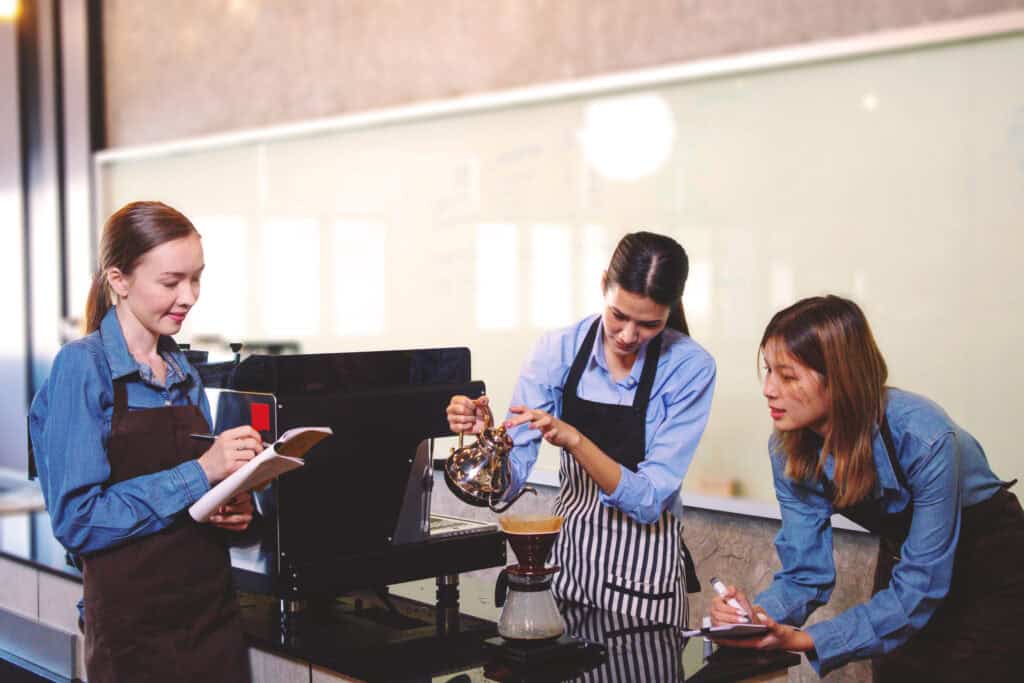
For example, as your team masters the roasting process, you’ll have opportunities to start hosting workshops that teach aspiring homebrewers how to do it themselves. Or, if you roast off-site, host tours so that your customers get to see the process in action. Watching your machines and your employees transform unroasted green beans into the specialty coffee you’re known for is a special experience that will help build customer loyalty for your brand.
Feeling really ambitious? If your setup is modestly sized, consider hosting a pop-up or installation. Bring your setup outside your facility somewhere public, and give coffee aficionados the chance to roast their own beans. This product interaction incentivizes the public to try your brand, leading to more sales and stronger customer relationships.
Good Coffee Starts On-Site
You no longer have to be an experienced roaster to bring the roasting process in-house. With cafe-ready machinery from innovative companies such as Bellwether Coffee and Mill City Roasters, there’s much less of a learning curve, and you’ll need only a small amount of space to build out your roasting setup. The days of roasting your own coffee are here, making your potential standing within the coffee industry all the stronger.
The Newsletter For Small Businesses
Weekly expert insights, industry trends, and inspiring stories designed to help you run your business with confidence.
The Only Inventory System That Actually Helps You Run A Healthy Business
Thousands of customers all over the world use Thrive Inventory to run a healthy business.
Thrive Inventory gives you control over all your inventory, sales channels, and metrics, allowing you to make the right decisions at the right time.
Keep Reading

The Newsletter For Small Businesses
Weekly expert insights, industry trends, and inspiring stories designed to help you run your business with confidence.
Try Thrive Inventory For Free
Add Thrive Inventory to your business and maximize your potential. With powerful and easy-to-use products, it’s time to take control
of your business and see what you can do with Thrive.
